
 Skala Thermis
Skala Thermis
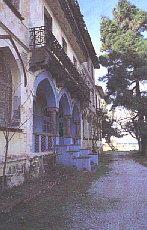 There was a Grand old Hotel in Skala Thermis. It was built nearly a century ago next to the ancient hot mineral baths. There were beautiful gardens with tropical plants and palm trees and next to a large fountain a band played in the late afternoon and early evening. People came from all over to stay in the hotel and to bathe in the therapuetic waters, to swim in the sea and eat in the fish restaurants. Then someone discovered some antiquities while digging in the garden. The archeologists came in. They dug up the entire garden and exposed the foundation stones of ancient buildings. That's how they left it. The hotel is closed now. The building is falling into ruin and the garden no longer exists. As for the ruins that were discovered beneath it, they are of little interest to anybody. Just another place for people to throw their garbage. Now when one of the locals digging in his garden finds something of interest, he quickly hides it, like a family secret, careful not to let anybody know for fear that the ar
cheologists will come and destroy his home, like they destroyed the old hotel.
There was a Grand old Hotel in Skala Thermis. It was built nearly a century ago next to the ancient hot mineral baths. There were beautiful gardens with tropical plants and palm trees and next to a large fountain a band played in the late afternoon and early evening. People came from all over to stay in the hotel and to bathe in the therapuetic waters, to swim in the sea and eat in the fish restaurants. Then someone discovered some antiquities while digging in the garden. The archeologists came in. They dug up the entire garden and exposed the foundation stones of ancient buildings. That's how they left it. The hotel is closed now. The building is falling into ruin and the garden no longer exists. As for the ruins that were discovered beneath it, they are of little interest to anybody. Just another place for people to throw their garbage. Now when one of the locals digging in his garden finds something of interest, he quickly hides it, like a family secret, careful not to let anybody know for fear that the ar
cheologists will come and destroy his home, like they destroyed the old hotel.
We arrive in Skala Thermis after driving the coastal road of western Lesvos with Amarandi in the front seat and Andrea recuperating in the back. The mountains of Turkey appear as if they are just around the next bend. There are small military bases on along the way with suspicious tin huts like the one in Gavatha that housed the rusted tank. I imagine that these mountains could be hollow, full of soldiers and weapons, waiting for the Turkish armada to cross the straits. But despite a visable military presense that is surely only the tip of the iceburg, the road and coastline is very beautiful and the ride enjoyable.
Katy lives in a big old house right on the sea, that her grandfather built. Her mother is a Greek/American from California and lives upstairs. She rents out rooms in the summer. The last time we were here Skala Thermis was packed. Now it's quiet. A fishing boat is being pulled from the water for the winter. A couple old ladies are knitting, and the seaside cafes and tavernas are empty. But it's warm like a comfortable summer day and the prospect of Amarandi being able to play with Katy's children in this house a few meters from the sea makes us feel like we are taking a vacation within a vacation. Katy had gone to highschool with Andrea and I, twenty-some years before. She is now married to Nasos, a schoolteacher, who looks like he could be the bass player or drummer of a heavy metal band. For the last few years they have been living wherever he has been stationed. One year it was a tiny islet off the coast of Chios. Before that they were in Limnos and Kos. Last year they sent him to Antissa, way on the other
side of the island. The children did not want to leave their cosmopolitan school in Mytilini town for the tiny rural school of Antissa, so Nassos commuted two hours each way every day. This year he is in Agiassos, which is only about an hour away, but they are hoping for a permenant job in the Cyclades, hopefully Paros or Sifnos.
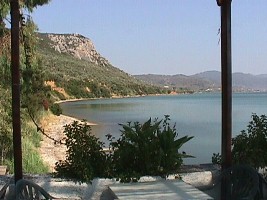 We join them on their tiny balcony. Their teenage daughter Dora is in the next room playing some kind of contemporary disco-pop that has been driving Nassos crazy all day. He asks her to turn it down but she refuses so he counters by playing Genesis in the kitchen. I'm getting dueling musical preferences in stereo as we drink coffee and watch the children play. Her youngest son Strataki is Amarandi's age and requires constant vigilance because of his adventerous spirit. Marilise is nine, blonde and beautiful. When we finally go to the taverna nearby she drinks two coca-colas and eats an entire giant squid.
We join them on their tiny balcony. Their teenage daughter Dora is in the next room playing some kind of contemporary disco-pop that has been driving Nassos crazy all day. He asks her to turn it down but she refuses so he counters by playing Genesis in the kitchen. I'm getting dueling musical preferences in stereo as we drink coffee and watch the children play. Her youngest son Strataki is Amarandi's age and requires constant vigilance because of his adventerous spirit. Marilise is nine, blonde and beautiful. When we finally go to the taverna nearby she drinks two coca-colas and eats an entire giant squid.
We are the only customers at the fish restaurant that last August we waited half hour to be seated and another hour to be served because of the hordes of Athenians who filled the tables that spilled out onto the quay. It's early though and the fires have not been lit so we drink ouzo and beer and have a few bites of salad, feta and sadziki. We are joined by Katy's brother Ted, who is a horticulturalist on the island but got his degree in California. When the grill is finally fired up and we are able to order fish, I don't care what I eat, being so high on ouzo and conversation. Nassos is very difficult for me to understand because of his accent, dialect or the fact that I loose the thread of his conversation and go into a panic trying to relocate it. Then I appeal to Andrea for help but she usually has not been listening and makes him repeat it. By the time it's respoken and translated I have no idea what we were even talking about. But it makes for some fun misunderstandings. Katy tells us she went to Athens
for the first time in ten years. She hasn't been to the states in twenty and needed to renew her passport. But she has been to Turkey several times and points across the sea to the lights of Ayalik that are beginning to flicker on. We are sitting under a string of octopus. Occasionally one is taken down, a leg or two cut off, grilled and served to us. It's a perfect photo opportunity of postcard or National Tourist Board quality. "This is Greece" Nassos jokes as Andrea takes the picture because the beautiful mountains on the wine dark sea are actually Turkey.
I find it strange to be sitting between Katy and Andrea. Twenty-five years before we had been students together in Athens and though we never really spoke and could not be called friends, we would say hi to each other when we passed in the halls. Perhaps somehow we knew that many years in the future we would be friends. I have read that our lives are a script that not only are we following, but we have written it. On another level we know everything that is to happen to us so you could say that all those years ago we recognized each other from our future.
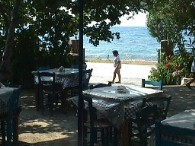 We eat a delicious plate of grilled sun-dried makeral, red with spices. It's cooked so perfectly that not only is the meat soft, moist and delicious but the bones are crunchy and just as good. When it's finished there is nothing but an empty plate. Nassos has a long journey to school tomorrow and as English has taken over the conversation feels left out. He and Katy leave with the children who had been happily playing in the restaurant's garden, Amarandi included. Andrea goes off to find a phone to call Pamela while Ted and I engage in conversation. I try to entice him with my idea of a live music bar in Erressos. He's interested. His business is slow getting off the ground. There is not a huge market for exotic ornamental potted plants and there's also a competing company. The night air is sweet and I tell him that last year there was an overpowering stench of raw sewage.
We eat a delicious plate of grilled sun-dried makeral, red with spices. It's cooked so perfectly that not only is the meat soft, moist and delicious but the bones are crunchy and just as good. When it's finished there is nothing but an empty plate. Nassos has a long journey to school tomorrow and as English has taken over the conversation feels left out. He and Katy leave with the children who had been happily playing in the restaurant's garden, Amarandi included. Andrea goes off to find a phone to call Pamela while Ted and I engage in conversation. I try to entice him with my idea of a live music bar in Erressos. He's interested. His business is slow getting off the ground. There is not a huge market for exotic ornamental potted plants and there's also a competing company. The night air is sweet and I tell him that last year there was an overpowering stench of raw sewage.
"There is no raw sewage here", he says with authority. "That smell is rotting seaweed" I realize he could be right because it's all over the beaches. I think back to other places that had that same smell and I realize that they too had beaches that were rich with seaweed. So I had been wrong and places that had disgusted me because I imagined their pristine looking waters to be so full of human waste that I refused to swim or set foot in them, were actually as clean as they appeared.
Andrea returns. Pamela was hysterical over the phone. The workers had done something completely wrong while she wasn't looking. She's all alone. We didn't paint the shutters. At the same time Nassos reappears to say that Amarandi is crying for her mother. Andrea leaves Ted and I to resume our conversation. He asks if he should order another ouzo. I'm thinking no but I hear myself say yes. The magical power of the drink. Then he tells me something that shatters my entire romanticized perception of the wonderful healing properties of Mytilini ouzo.
"It's not really made here", he tells me. "It's just assembled." He explains that the island which in ancient times was famous for it's grapes because it is such an ideal climate, suffered a blight from which its grape crop never recovered. It is only now that they have discovered a method of grafting that can make the plants resistant to this disease. In the absense of any grapes, all the raw ingredients are bought from other places. The distilled alchohol may come from other islands, the main land or Bulgaria. Then it is flavored and bottled. The famous Mattis Ouzo all comes from a little shop in Mytilini town. With the exception of Plomari there are no real distilleries and you don't need a lot of space to pour alchohol, sugar, anise and another herb or two into bottles.
This is stunning news and I don't know whether to believe him or not. The whole world believes that this is the home of ouzo and I'm finding out that all the ingredients are imported. The world famous Mytilini ouzo could just as easily come from Carrboro, North Carolina. In shock I stumble into the restaurant to see what there is to eat with this new bottle of Ouzo Kefi that the waitor has brought to our table. Who knows where it's ingredients come from? They could be the finest grapes from Santorini or some rotton potatos from Romania. Who knew? But one thing could not be argued or dismissed. I felt pretty damn good from drinking it and it certainly made everything else taste better. Even sardelles pastes. I asked if they had any. They didn't but they did have some fried anchovies that looked great. I ordered some and some potatos too. I asked the owner, a wild eyed man with flaming red hair that stood on end if he remembered me from last year.
"Yes. You are the American with the wife and child". He actually seems excited or else that's just how he always looks. When the fish comes the waitor brings another bottle of ouzo.
"It's from him," he points in the direction of a large table by the sea where the owner has taken a seat at the head of an enormous family which does not appear to be his own. There is no way that we can drink this next bottle and we don't even attempt to open it, so we toast him with the dregs of our last. He waves back at us as I hide the bottle in my pocket.
As we leave Ted needs cigarettes. The kiosk is dark and closed up but he calls out the man's name and a voice comes from inside. A man emerges and hands Ted a pack of ciggarettes. "It must be great to have important friends in high places," I remark. If it was me who had run out of ciggarettes I would be out of luck. I would have had to drive to the next village or else suffer through the night. We return to the house and Ted shows me my room. Amarandi is asleep in the cot and I climb in the double bed next to Andrea, but by morning, somehow I wake up in the cot and Amarandi is in the big bed.
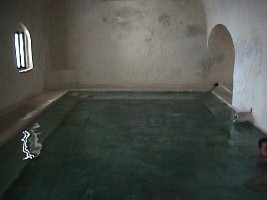 The following day is a designated day of rest, for Andrea's sake, and we stay pretty close to home, or Katy's home. I do drive katy to the village of Panayouda down the coast tho buy some chicken since the butcher in Skala Thermis has gone out of business. Katy makes us a fantastic lunch of roast chicken and potatoes, my favorite Greek dish and the best I have ever tasted.
Andrea goes to the healing mineral baths and returns feeling much better. She tries to convince me to go and finally around five I do, but there is a long line of old women in the lobby eact holding a piece of paper with a number on it. I'm the only person under seventy and I am also the only male. I do the more manly thing and go across the street to the cafeneon and have a Greek coffee instead. Soon I am feeling as if I had taken a dozen mineral baths and I am ready for adventure. We take Marilise as a companion for Amarandi and drive to Mytilini.
The following day is a designated day of rest, for Andrea's sake, and we stay pretty close to home, or Katy's home. I do drive katy to the village of Panayouda down the coast tho buy some chicken since the butcher in Skala Thermis has gone out of business. Katy makes us a fantastic lunch of roast chicken and potatoes, my favorite Greek dish and the best I have ever tasted.
Andrea goes to the healing mineral baths and returns feeling much better. She tries to convince me to go and finally around five I do, but there is a long line of old women in the lobby eact holding a piece of paper with a number on it. I'm the only person under seventy and I am also the only male. I do the more manly thing and go across the street to the cafeneon and have a Greek coffee instead. Soon I am feeling as if I had taken a dozen mineral baths and I am ready for adventure. We take Marilise as a companion for Amarandi and drive to Mytilini.
When we get to the outskirts of the city I have one thing in mind and that is to go to the ouzerie on the end of the small promontory that juts out into the harbor and watch the ferry leave. As we come over the hill I can see the smokestack of the ship rising among the taller buildings and I know we are on time. We drive along the waterfront and park behind the row of fish restaurants that specialize in local fried shrimp. We walk down a narrow causeway with small fishing boats tied on either side. At the very end is the ouzerie which has been changed since last year into more of a cafeneon. Instead of families it is full of old men and the patio has been newly paved. We order two ouzo's and take in the scenery. The lights of the city are beginning to come on as the sun is setting behind us. On the opposite side of the harbor but very close is the ferry boat Sapho, loading trucks and passengers. We send the girls off to find ice-cream while we sip our ouzo and eat the octopus cooked in wine sauce that has bee
n served to us as meze. As darkness decends the ships lights begin to come on until it looks like a big white christmas tree. We sit watching the slow chain of events as it makes ready to sail while the girls happily throw bread to the small fish in the water next to us. It's dark now and the full moon rises over the bow of the ship. Andrea attempts a time lapse photograph as the excursion boat returning from Turkey passes by. As the ships preparation begins to speed up the girls have taken an interest and sit at the end of the dock in rapt attention. There is a small shrine to Saint Nicholas which has just had it's candle lit by the owner of the cafeneon. As the ramp of the ship is lifted from the dock across the harbor, a big rat darts among the rocks next to the paved patio. Amarandi has never seen one before and runs to get a closer look. The rat is foraging for food and takes no notice of Amarandi or the old men sitting outside. When he disappears around the corner Amarandi returns to watch the rest of t
he boat show. The ship is being pulled forward towards it's anchor by the engine that pulls up the heavy chain. It seems to sit in the middle of the harbor for a moment, then propels itself as the propellers churn up the sea behind it. It picks up speed and sails out of the harbor, but instead of going straight towards Pireaus it makes a complete turn towards Limnos, Kavala, or Thessaloniki.
When we get back into the car the city is alive with cars, motorcycles and pedestrains. There is a giant cafeneon on the waterfront big enough for hundreds of old men and it is full, as are the snack bars and cafes. Mytilini is a hopping town, full of young soldiers and girls, like Saigon at the height of American involvement in Viet-nam. "I could easily live here" I say to Andrea.
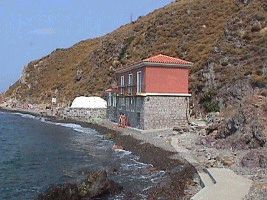 We circle around the city to the coastal road where we see the Sapho heading north. "Let's catch the ship!" I yell to the kids and they cheer me on as the trip home becomes a race. The ferry seems to have the advantage because even though I can drive faster, the road is full of curves and turns while the Sapho just has to go straight ahead. Everytime we come over a hill the ship is in sight a little in front of us. Andrea is worried that I am driving too fast after too many ouzos but I am actually being very careful with my precious cargo. When we get to Skala Thermis, Katy and her mom are sitting in front of the house watching the ship sail by. The moon is shining on the sea between us and Turkey and the Sapho looks like a floating Las Vegas casino. It's a beautiful night.
We circle around the city to the coastal road where we see the Sapho heading north. "Let's catch the ship!" I yell to the kids and they cheer me on as the trip home becomes a race. The ferry seems to have the advantage because even though I can drive faster, the road is full of curves and turns while the Sapho just has to go straight ahead. Everytime we come over a hill the ship is in sight a little in front of us. Andrea is worried that I am driving too fast after too many ouzos but I am actually being very careful with my precious cargo. When we get to Skala Thermis, Katy and her mom are sitting in front of the house watching the ship sail by. The moon is shining on the sea between us and Turkey and the Sapho looks like a floating Las Vegas casino. It's a beautiful night.
We go to dinner at the Platanos again. Tonight we have fava beans and greens along with the spicy sundried mackeral, octopus, fried fresh squid and sadziki. We also order fried eggplant and grilled sausages which are supposed to be for Amarandi but end up being for me. Amarandi has rediscovered kalamaraki and eats one piece after another. Andrea and I take it easy tonight and only share one bottle of Barbayannis ouzo from Plomari, which we don't even finish. Katy tells us that a couple weeks ago Nassos' sister read their coffee cups and told them they would not be going anywhere but would be getting a visit from some friends with dark curly hair. They would come from over the ocean and the name starts with the letter 'M'. Katy didn't even think of us, it being so late in the season that we surely were not coming this year, but when Nassos saw us that first day in the market he remembered the prophesy.
We trade ferry boat stories. Katy admits she loves the boats. They represent all that she loves about Greece. The sea, traveling, summers. She tells the story of when they moved to the island of Kos where Nassos was teaching. He had gone first to get established and find a place for them to live. She had come with the kids a couple weeks later. When they arrived on the dock she kissed Nassos hello and then he ran into the boat to get their luggage. While he was inside, the boat lifted up the ramp and sailed away with him on it, while Katy and the children stood on the dock of a strange island staring in disbelief at the ship sailing out of the bay with Nassos on it. Luckily he had come with a friend who took them to their new house. Nassos had run up to the bridge of the ship in tears and told the captain what had happened. The captain handed him a bottle of whiskey for the long trip to Rhodos and back.
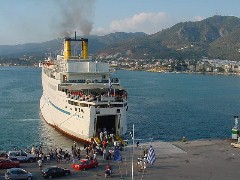 I was moved by her tale and told her a sad boat story of my own. It was September and me and all my friends were leaving Sifnos. Some had left the day before and we planned to meet in Athens for one last evening together before we got on our separate flights to our homes in different countries. I was on the Kimolos with a couple friends from the states. We docked in Pireaus at nine PM which gave us enough time to dump our bags, call everybody and meet at a taverna. Since it was the end of the summer the ship was full and everyone was crowding to the rear to disembark. My friends were anxious to get on dry land but I told them I prefer to wait and make my way leisurely off the ship instead of fighting the crowds. They went ahead. I sat on the deck enjoying myself and the lights of Pireaus harbor until the crowd had thinned out enough so that I could rejoin my friends on the dock. Just as I reached the garage of the ship, it lurched forward. People were screaming and trying to keep their balance as the ship pul
led away from the dock. It took a few minutes, but we finally realize what has happened. Next to us the ferry boat Aegeon, leaving for Samos has gotten its anchor tangled in our anchor chain and had dragged us away from the dock. For two hours the ships do a little dance, nose to nose with each other in the middle of the harbor trying to extricate themselves. Finally the Aegeon sails away, but the ramp of the Kimolos had fallen down and broken its cables so there is no way for us to get off the boat. There were still several trucks on board and they tied a rope from one to a pulley on the upper railing and then to the ramp and try to pull it up. The tires of the huge truck were burning rubber on the ships metal garage floor and to me it looked hopeless and dangerous. I was waiting for the cable to snap and kill us all. Men were yelling at each other about how it should be done and they made several attempts but in the end it didn't work. Finally they gave up on getting the vehicles off. They tied the ship up
sideways to the pier and lowered the rusty old emergency stairway that was used in the days when some islands didn't have docks and the passengers were taken from the ships in small boats. I touched the shores of Attika at one AM, four hours after my ship had arrived. Needless to say I missed the party.
I was moved by her tale and told her a sad boat story of my own. It was September and me and all my friends were leaving Sifnos. Some had left the day before and we planned to meet in Athens for one last evening together before we got on our separate flights to our homes in different countries. I was on the Kimolos with a couple friends from the states. We docked in Pireaus at nine PM which gave us enough time to dump our bags, call everybody and meet at a taverna. Since it was the end of the summer the ship was full and everyone was crowding to the rear to disembark. My friends were anxious to get on dry land but I told them I prefer to wait and make my way leisurely off the ship instead of fighting the crowds. They went ahead. I sat on the deck enjoying myself and the lights of Pireaus harbor until the crowd had thinned out enough so that I could rejoin my friends on the dock. Just as I reached the garage of the ship, it lurched forward. People were screaming and trying to keep their balance as the ship pul
led away from the dock. It took a few minutes, but we finally realize what has happened. Next to us the ferry boat Aegeon, leaving for Samos has gotten its anchor tangled in our anchor chain and had dragged us away from the dock. For two hours the ships do a little dance, nose to nose with each other in the middle of the harbor trying to extricate themselves. Finally the Aegeon sails away, but the ramp of the Kimolos had fallen down and broken its cables so there is no way for us to get off the boat. There were still several trucks on board and they tied a rope from one to a pulley on the upper railing and then to the ramp and try to pull it up. The tires of the huge truck were burning rubber on the ships metal garage floor and to me it looked hopeless and dangerous. I was waiting for the cable to snap and kill us all. Men were yelling at each other about how it should be done and they made several attempts but in the end it didn't work. Finally they gave up on getting the vehicles off. They tied the ship up
sideways to the pier and lowered the rusty old emergency stairway that was used in the days when some islands didn't have docks and the passengers were taken from the ships in small boats. I touched the shores of Attika at one AM, four hours after my ship had arrived. Needless to say I missed the party.